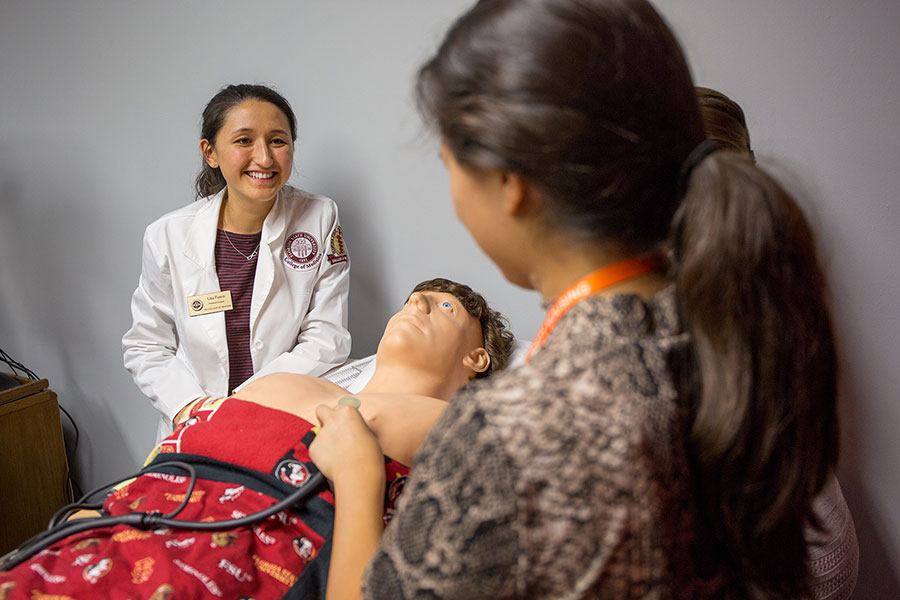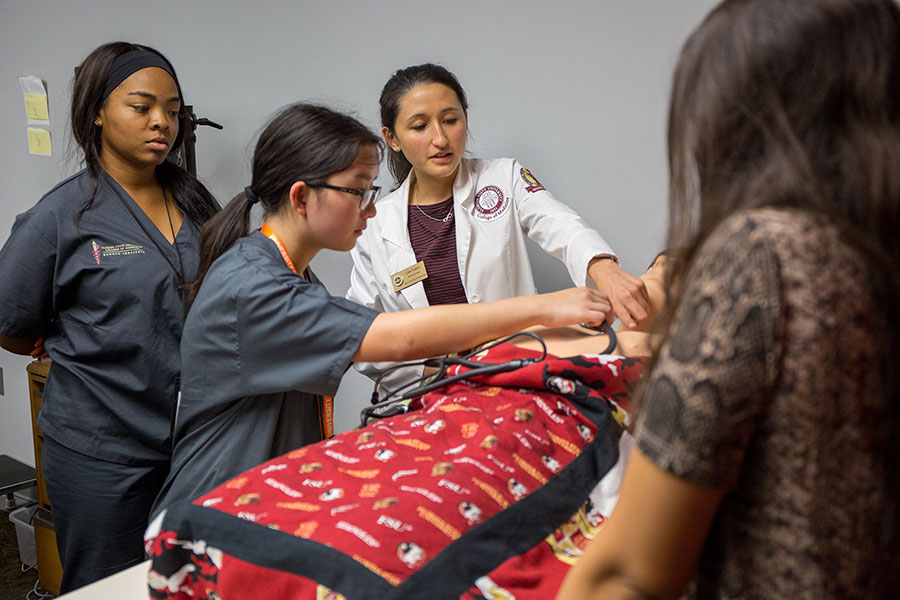
In 2012, high school student Lisa Fusco attended the College of Medicine’s SSTRIDE Summer Institute thinking maybe she’d like to be a doctor someday. Seven years later, Fusco is part of the Summer Institute again. This time, she’s a second-year medical student and mentor.
For each of the past 12 years, the FSU College of Medicine has hosted rising high school juniors and seniors for the Summer Institute, a weeklong “mini med school” experience. Its purpose is to encourage students from different backgrounds to consider a career in medicine.
More than 600 students have participated in the Summer Institute over the years.
For Fusco, it was the Introduction to Anatomy course and tour of the lab that solidified her dream of attending the College of Medicine and becoming a doctor.
“I was fascinated by the human body, and I even wrote about the anatomy lab experience in my personal statement,” said Fusco. “I knew then that it was what I wanted to do. And now I’m a teaching assistant for the anatomy lab, so it’s really come full circle.”
As a teaching assistant, Fusco is spending her summer assisting first-year medical students – and Summer Institute participants – with anatomy. Among those first-year students are fellow Summer Institute alumnae Amara Ahmed, Sarah Crawford, Mirna Hanna and Laura Samander.
“Growing up, a lot of people say to you, ‘Oh, you want to be a doctor? That’s cool,’ but there’s nothing that facilitates your way to get there,” said Fusco. “The Summer Institute made it a reality for me, and it was incredibly rewarding working with the students in the first session last week.
“At such a young age, my experience really had an impact on me, and it stuck with me as I was taking all those hard science courses over the years. I had a light at the end of the tunnel and kept reminding myself I can actually get there.”

Sixty-three rising high school juniors and seniors are taking part in one of this summer’s three Summer Institute sessions. The first session concluded June 14. The final two take place June 23-28 and July 14-19.
The Summer Institute is hosted by the college’s Science Students Together Reaching Instructional Diversity & Excellence (SSTRIDE) program. It was designed to help address disparities in Florida’s physician workforce by starting early to prepare and train future physicians to serve Florida’s traditionally underserved populations.
Eighty percent of the 400 past participants currently being tracked have gone on to attend college with a major in science, technology, engineering, math or medicine. At least 16 have gone to medical school.
“I am humbled and honored each year as I witness the impact that our office and programs have on SSTRIDE and Summer Institute students,” said Thesla Berne-Anderson, founder and director of the precollege and undergraduate outreach programs at the College of Medicine.
The Summer Institute immerses students in the medical school environment. Students stay in dorms on campus and take part in activities, discussions, classes and training both at the College of Medicine and at local hospitals, medical practices, assisted-living facilities and more. Each day features a different focus such as geriatrics, primary care or rural medicine.
Students also receive information about college admissions, scholarships and mentoring programs while gaining a valuable perspective on the life of a medical student. A number of the week’s activities – including trips to rural medical practices, clinical skills training, and courses on medical ethics and mental health – involve training and instruction similar to what real med students get.
“Students benefit in so many ways and as a result are better and more focused communicators, thinkers, leaders and doers,” added Berne-Anderson. “More and more students are choosing FSU as a result of the Summer Institute experience and are excited about joining our college-level outreach pipeline.”
For more information on the FSU College of Medicine’s SSTRIDE Summer Institute, visit https://med.fsu.edu/outreach/summer-institute.




